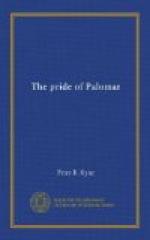“How about food, Pablo?”
“Unfortunately, Father Dominic had neither sugar nor cream. It appears such things are looked upon at the mission as luxuries, and the padres have taken the vow of poverty. He could furnish nothing save half a ham, which is of Brother Flavio’s curing, and very excellent. I have tasted it before. I was forced to ride to the Gonzales rancho for the cream and sugar this morning, and have but a few moments ago returned.”
Having deposited the pitcher of hot water, Pablo retired and, for several minutes, Miguel Farrel lay abed, gazing at the row of portraits of Noriagas and Farrels. His heart was heavy enough still, but the first benumbing shock of his grief and desperation had passed, and his natural courage and common sense were rapidly coming to his aid. He told himself that, with the dawning of the new day, he would no longer afford the luxury of self-pity, of vain repining for the past. He had to be up and doing, for a man’s-sized task now confronted him. He had approximately seven months in which to rehabilitate an estate which his forebears had been three generations in dissipating, and the Gaelic and Celtic blood in him challenged defeat even in the very moment when, for all he knew to the contrary, his worldly assets consisted of approximately sixty dollars, the bonus given him by the government when parting with his services.
“I’ll not give up without a battle,” he told his ancestors aloud. “You’ve all contributed to my heavy load, but while the pack-straps hold and I can stand and see, I’ll carry it. I’ll fight this man Parker up to the moment he hands the county recorder the commissioner’s deed and the Rancho Palomar has slipped out of my hands forever. But I’ll fight fair. That splendid girl—ah, pooh! Why am I thinking of her?”
Disgusted with himself for having entertained, for a fleeting instant, a slight sentimental consideration for the daughter of his enemy—for as such he now regarded this man who planned to colonize the San Gregorio with Japanese farmers—he got out of bed and under the cold shower-bath he had installed in the adjoining room years before. It, together with the tub-bath formerly used by his father, was the only plumbing in the hacienda, and Farrel was just a little bit proud of it. He shaved, donned clean linen and an old dressing-gown, and from his closet brought forth a pair of old tan riding-boots, still in an excellent state of repair. From his army-kit he produced a boot-brush and a can of tan polish, and fell to work, finding in the accustomed task some slight surcease from his troubles.
His boots polished to his satisfaction, he selected from the stock of old civilian clothing a respectable riding-suit of English whip-cord, inspected it carefully for spots, and, finding none, donned it. A clean starched chambray shirt, set off by a black-silk Windsor tie, completed his attire, with the exception of a soft, wide, flat-brimmed gray-beaver hat, and stamped him as that which he had once been but was no longer—a California rancher of taste and means somewhat beyond the average.




